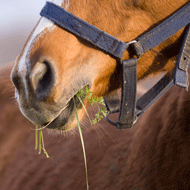Gastric ulcer risk with low fibre diets, nutritionists warn

Horses on a restricted forage diet with nothing to eat for long periods are prone to developing gastric ulcers.
Competition horses are at risk of gastric ulcers if their forage is restricted in favour of high energy cereals, a feed company has warned.
The energy supplied by forage alone is often not enough for the work horses are required to do and, as a result, they may be fed less forage and more high energy feedstuffs, such as cereals.
But studies have shown that, in some competition disciplines, up to 60 per cent of horses are affected by gastric ulcers.
Horses are evolved to spend up to 18 hours per day eating and 65 per cent of the gut is devoted to digesting fibre, nutritionists at Winergy say.
The stomach produces acid continually, but horses can only produce acid-neutralising saliva when they chew. Therefore, those on a restricted forage diet with nothing to eat for long periods are prone to developing gastric ulcers. High cereal meals may also increase the risk due to excess fermentation in the stomach.
Exercise may make the problem worse by increasing gastric acid production, as it increases pressure in the abdomen, resulting in more gastric acid splashing onto the upper part of the stomach.
Winergy nutritionist Clare Barfoot advised owners not to leave horses for more than six hours without forage. "It’s also best to restrict starch intake to less than 2g/kg bodyweight per day," she added.
"Adding chopped fibre, particularly alfalfa, is also helpful. It will extend eating time and the high protein and calcium content may help to buffer stomach acid to help maintain a fibre mat in the stomach to help to prevent 'gastric splashing'."



 The Federation of Independent Veterinary Practices (FIVP) has announced a third season of its podcast, Practice Matters.
The Federation of Independent Veterinary Practices (FIVP) has announced a third season of its podcast, Practice Matters.